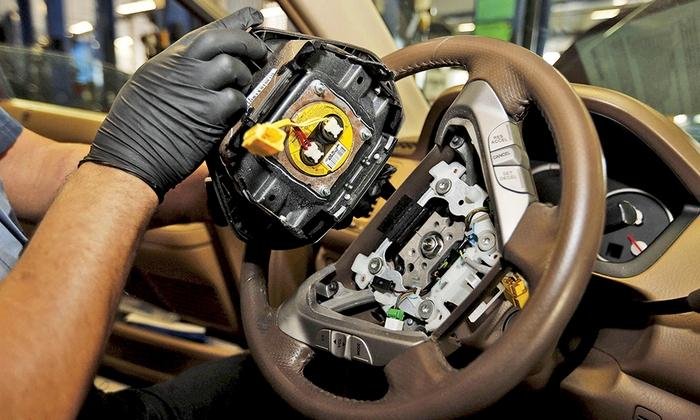Takata Review Panel Flags Quality Control Problems

An independent review panel appointed by Takata Corp. pinpointed a number of red flags in the troubled airbag maker's quality control.
The report cited several flawed practices, including a troubling habit of allowing products under development to continue downstream even though design milestones were not met.
The panel also recommended adopting "use by" dates for airbags. Under that proposal, the expiration dates would be adopted across the U.S. industry, requiring that old inflators be replaced after a set period of time with new ones less likely to have degraded chemically.
The panel's report, issued this month after nearly a year of studying the Japanese supplier, doesn't shed new light on the root cause of the Takata airbag defect linked to 10 deaths and responsible for tens of millions of vehicle recalls worldwide.
Takata had appointed former U.S. Transportation Secretary Samuel Skinner to lead the seven-member panel in a study focused on assessing quality in everything from product development to manufacturing. The panel included three former U.S. National Highway Traffic Safety Administration administrators: John Snow, who held the post in 1976-77; Marion Blakey, 1992-93; and Dr. Jeffrey Runge, 2001-05.
The panel made several recommendations on ways Takata can improve quality. It also gave the supplier one year to report back on the progress made in implementing the changes.
Shortcuts
It is one of several deadlines the embattled company faces.
For example, manufacturers' operations in states with high humidity, which has been linked to the airbag failures, must have enough parts on hand by March to complete all repairs, under a consent decree Takata reached with NHTSA.
And in November, NHTSA gave Takata until the end of 2019 to demonstrate the long-term safety of inflators using ammonium nitrate-based propellant.
If it can't, all Takata ammonium nitrate inflators, including those not currently under recall, would have to be replaced. That could add millions to the recall tally.
The suspect inflators can explode with too much force, showering the car's occupants with shrapnel. Analysis so far, while failing to find the root cause, has linked the problem to manufacturing glitches and chemical deterioration of the inflators due to heat and moisture.
The Skinner panel found gaps that may have exacerbated defects.
"After conducting an extensive review of Takata's quality-related operations and organization, the Panel concludes that Takata must improve in several areas," the group's 49-page report says.
Chief among them is a product development practice called "conditional approval." This happens when Takata waves a product through to the next stage of development even though it hasn't completed or fully addressed certain review milestones.
The panel said conditional approvals help create an environment where quality problems "slip through the cracks."
If the design issue is fixed later in review stage, it further complicates production engineering and could lead to hastily made assembly line changes that impact manufacturing quality.
The panel did not say how often Takata resorts to conditional approvals, but said it happened "more often than not." It recommended Takata reduce instances to 20 percent of the time.
Lack of rigor
Takata must also improve the design review process to make sure that the relevant people rigorously vet technology.
The current process is "more of an exercise in completion than a rigorous quality evaluation," the panel said.
"Takata's general practice is to invite large numbers of people, in some cases 100 or more, to its design review, but only a handful of those invited actually attend," the panel reported.
The report was also critical of Takata's practice of manufacturing inflators to a range of varying standards for customers but lacking testing specification of its own for parameters such as thermal shock. Takata needs its own testing specs "based on its own view of what is best from a quality perspective," it said.
The findings mirror the experiences of former employees-turned-whistleblowers who criticized Takata's review process when it decided to adopt the controversial ammonium nitrate inflators.
Among them is Mark Lillie, a former chemical engineer at Takata's Moses Lake, Wash., plant, who was asked to conduct an engineering review in 1999 when the company debated the switch.
"The design review was basically pro forma so that we could check the box off and say we did a design review," he said.
"They probably do and did have manufacturing errors that amplified the design problem," Lillie told Automotive News last year. "But even if you fix all the manufacturing problems, there is still an underlying design problem."
"Use by' dates
The panel largely praised Takata's manufacturing facilities as "state of the art." But it said some critical operations are still done manually, such as the loading of inflator propellant.
Takata should also invest in machine-assisted airbag folding, noting that some airbag folding requires 200 steps. It would be better to break that up among multiple workers or introduce machines for part of the folding rather than relying on one person to complete all 200 steps, the panel said.
"Best-in-class manufacturing pro- cesses are generally moving toward full automation, especially in safety-critical areas," it said. "Takata should follow suit as quickly as it is able."
The panel concludes by arguing airbags would benefit from "use by" dates because the components tend to degrade over time.
It drew comparison to pharmaceuticals and said cost should not be a deterrent because inflators go for around $30.
"Any other chemically driven product we purchase for health and safety -- from pharmaceuticals to carbon monoxide detectors -- has a "use by' date," the report said, contrasting that with airbags. "Yet, even with the advancing age of the vehicle fleet, there is no plan in place for replacing these components."
Nouvelles connexes


